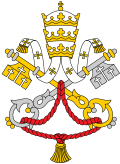Pontificium consilium pro dialogo cum non credentibus | |
| Abbreviation | PCDNC |
|---|---|
| Predecessor | Secretariat for Non-Believers |
| Merged into | Pontifical Council for Culture |
| Established | 6 April 1965 |
| Founder | Pope Paul VI |
| Founded at | Vatican City |
| Dissolved | 4 March 1993 |
| Purpose | to promote dialogue with non-believers |
Main organ | Secretariat |
Parent organization | Roman Curia |
Formerly called | Secretariat for Non-Believers |
| [1] [2] | |
| Part of a series on the |
| Roman Curia of the Holy See |
|---|
 |
| |
The Pontifical Council for Dialogue with Non-Believers (Latin : Pontificium consilium pro dialogo cum non credentibus, PCDNC) was a dicastery of the Roman Curia charged with promoting dialogue between the Catholic Church and non-believers. [3] Its original designation as "Secretariat" was changed to "Pontifical Council" on 30 June 1988. The PCDNC was merged into the Pontifical Council for Culture in 1993. [1] [2]